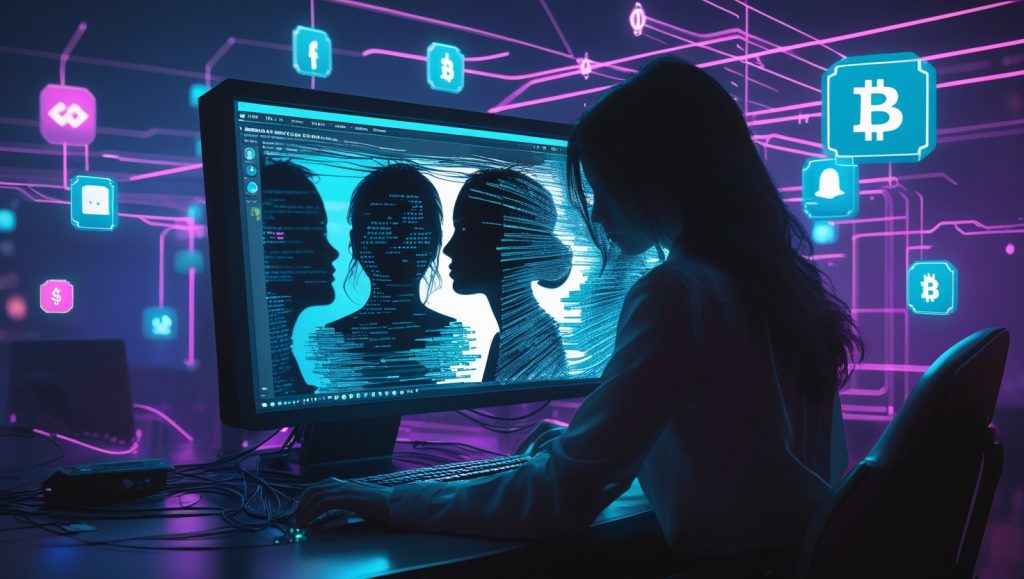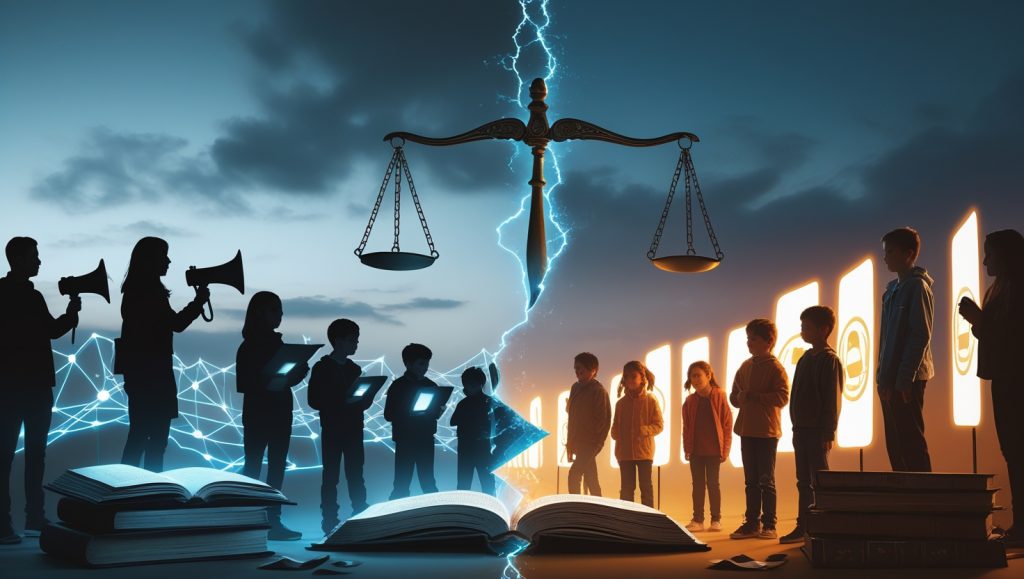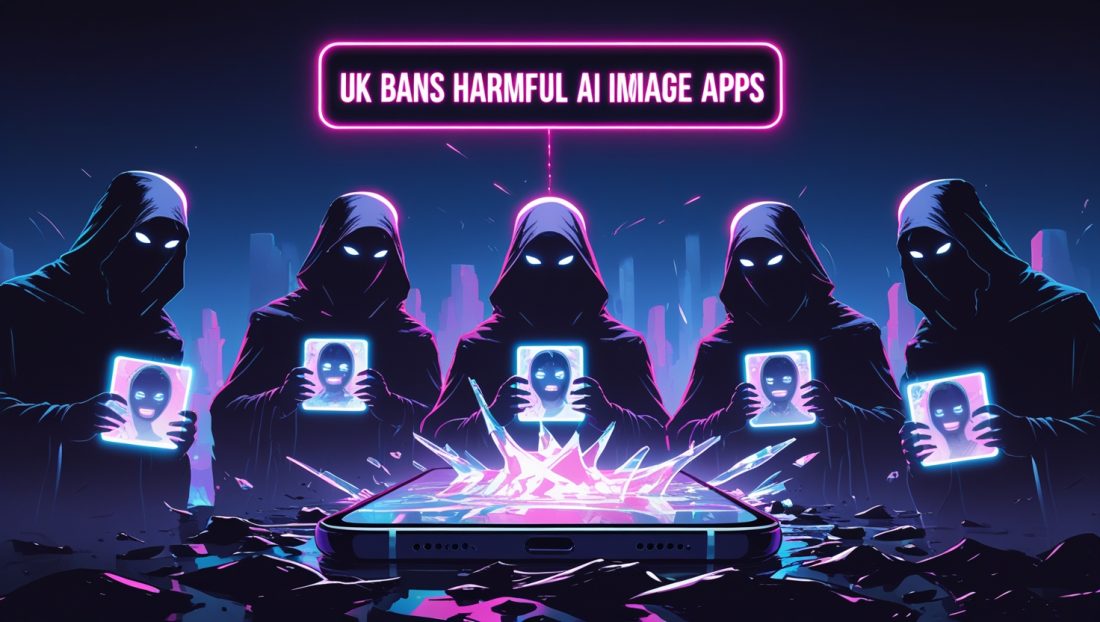A Digital Crisis Unfolding
What happens when technology designed to entertain becomes a weapon against children?
In early 2025, a leaked report from the UK’s National Crime Agency revealed a chilling statistic: 1 in 4 secondary schools had reported cases of AI-generated nude images circulating among students. This wasn’t a formed-up story—it was the harsh reality of AI nudification apps, tools that use machine learning to strip clothing from photos or superimpose faces onto explicit content.
The UK now stands at a crossroads, with policymakers scrambling to implement an AI nudification apps ban UK before another generation pays the price. As reported by The Guardian, this urgency is echoed by the Children’s Commissioner, who has called for immediate action to outlaw these harmful tools. Read more about the Commissioner’s stance. For a deeper look at how AI ethics shape global tech policy, check out why AI ethics could save or sink us.
The Rise of AI Nudification Apps: From Dark Web to Mainstream

Understanding the Technology Behind the Threat
AI nudification apps leverage generative adversarial networks (GANs), a type of machine learning where two neural networks compete to create increasingly realistic images. Originally developed for benign purposes like photo restoration, these tools have been weaponized. A 2024 Stanford study found that 78% of nudification apps specifically target images of women and girls, training their algorithms on non-consensual pornography scraped from revenge porn sites. This misuse of AI mirrors broader concerns about unregulated tech, as seen in discussions on why the dark side of AI threatens our future.
Why Accessibility Fuels the Crisis
What once required technical expertise now takes seconds:
- Free Apps: Tools like “Nudify.Online” offer 5 free deepfakes daily.
- Social Media Integration: TikTok filters disguised as “body positivity” tools covertly collect training data.
- Blockchain Payments: Developers use cryptocurrency to evade financial tracking.
The UK Safer Internet Centre reported a 412% increase in school-reported deepfake incidents between 2023 and 2025, with girls aged 11-14 being the most frequent targets. The AI nudification apps ban UK is critical to curb this accessibility, a challenge also faced in other AI-driven sectors, such as AI-powered content discovery.
Case Studies: When Technology Meets Trauma
Real-World Impacts Beyond Statistics
- The Essex School Scandal (2024): Over 200 students at a comprehensive school had photos manipulated into explicit content using “DeepNude AI”. Headteacher Sarah Thompson recalls: “We had Year 9 girls refusing to attend classes, terrified their PE photos would be weaponized next.”
- Celebrity Exploitation: Pop star Billie Eilish testified before Parliament about AI clones of her likeness appearing in over 12,000 pornographic videos. “It’s not just me—it’s every girl with a social media presence,” she stated.
- The Brighton Suicide Cluster: Five teen suicides in 2024 were linked to AI-generated blackmail material, prompting the NHS to establish dedicated deepfake trauma clinics.
These cases highlight why the AI nudification apps ban UK is urgent. Similar ethical dilemmas arise in AI applications like AI mental health early detection, where technology’s promise must be balanced against its risks.
Legal Labyrinth: Why Existing Laws Fail

The 2024 Online Safety Act’s Blind Spots
While the Act criminalizes sharing AI-generated child sexual abuse material (CSAM), it doesn’t address:
- App Development: Creating nudification tools remains legal.
- Consensual Adult Use: Loopholes allow apps to claim “ethical” purposes.
- Cross-Border Jurisdiction: 68% of offending apps are hosted in unregulated zones like the Cayman Islands.
The AI nudification apps ban UK aims to close these gaps, a topic also relevant to global AI regulation debates, as explored in global AI regulation divide 2025.
Why Prosecution Remains Elusive
In a landmark 2025 case, 17-year-old “Child X” successfully sued app developer DeepSwap under the UK’s Malicious Communications Act. However, as privacy lawyer Amanda Manyard explains: “Each case requires proving specific intent to cause distress—an almost impossible standard when apps have plausible deniability.” This legal challenge underscores the need for the AI nudification apps ban UK, echoing issues in AI copyright ownership wars.
The Children’s Commissioner’s Four-Pillar Strategy
Beyond Bans—A Holistic Approach
Dame Rachel de Souza’s 2025 report outlines a comprehensive solution, as detailed by the BBC, which highlights her call for a government ban on AI apps producing sexual images of children. Explore the BBC’s coverage. This strategy supports the AI nudification apps ban in the UK and aligns with broader efforts to regulate AI, as seen in why explainable AI is the future.
- Legislative Reform
- Amend the Product Security and Telecommunications Infrastructure Bill to include AI risk assessments.
- Introduce AI-Specific Criminal Offenses (e.g., “Development of Harmful Synthetic Media”).
- Tech Accountability
- Mandate On-Device Content Moderation for all generative AI tools.
- Require app stores to conduct Child Impact Assessments.
- Victim Support
- NHS funding for Deepfake Trauma Therapists.
- Automatic Image Removal orders through Family Courts.
- Global Collaboration
- Push for G7 adoption of The London Protocol on Synthetic Media.
Ethical Minefields: Free Speech vs. Protection

The Censorship Debate
Civil liberties groups warn against overreach. “Banning AI tools could stifle legitimate uses in medicine or art,” argues TechFreedom UK director Marcus Cole. However, as Childline reports a 900% increase in deepfake-related counseling sessions since 2023, the Children’s Commissioner counters: “When free speech endangers children, it’s not freedom—it’s failure.” Her official statement on the Children’s Commissioner website emphasizes children’s fears of becoming victims, underscoring the need for the AI nudification apps ban UK. See her full remarks. The AI nudification apps ban UK must navigate this tension, a debate also central to AI companions and ethics.
Why Schools Are Ground Zero for Change
Pioneering programs like Digital Self-Defense for Girls (DSDG) teach students to:
- Use AI Detection Tools like Microsoft’s Video Authenticator.
- Apply Privacy-First Photography techniques.
- Navigate Image Removal Processes.
FAQ: Your Top Questions Answered
What Are AI Nudification Apps?
AI nudification apps use artificial intelligence to remove clothing from photos or create fake explicit content. Often trained on non-consensual images of women and children, these tools exploit digital privacy and have sparked urgent calls for regulation to protect vulnerable users.
Are Nudification Apps Illegal Worldwide?
Only 12 countries, including the UK, Germany, and Australia, ban nudification apps as of 2025 under measures like the AI nudification apps ban UK. Most nations only criminalize sharing explicit content, not app development, allowing developers to operate in unregulated regions, which complicates the AI nudification apps ban UK enforcement.
How Can I Report AI-Generated Explicit Content?
In the UK, report harmful material via the AI Abuse Reporting Portal. Globally, contact local cybercrime units or NGOs like INHOPE. Quick reporting is key to protecting victims and curbing the spread of AI-generated explicit content.
How Can I Tell if an Image Is AI-Generated?
Spot AI-generated images by checking for unnatural shadows, inconsistent lighting, or blurred textures like hair or skin. Tools like Exif Viewer or Microsoft’s Video Authenticator can analyze metadata to confirm manipulation, helping verify image authenticity.
Can VPNs Bypass the AI Nudification Apps Ban UK?
VPNs can bypass some restrictions of the AI nudification apps ban UK, but app stores like Google Play and Apple now remove banned apps globally. Schools and ISPs also use Child Safety Firewalls to block VPN traffic, strengthening the AI nudification apps ban UK.
What Penalties Might Developers Face?
Under UK laws, first-time offenders face a £10 million fine or 10% of global revenue. Repeat violations can lead to 14-year prison sentences, reflecting a strong stance against harmful AI technologies.
The Road Ahead: Policy Predictions for 2026-2030
Emerging Technologies, Emerging Threats
- 3D Deepfakes: Holographic abuse leveraging Apple Vision Pro.
- Voice Cloning: Blackmail using AI-generated audio.
- Bio-Metric Data Theft: Using fitness app data to create hyper-realistic nudes.
These threats reinforce the urgency of the AI nudification apps ban UK, a concern echoed in AI in space exploration.
Why Proactive Legislation Is Non-Negotiable
As Dame Rachel warns: “Today’s nudification apps are just the tip of the iceberg. Without radical reform, we’ll face an AI abuse pandemic within a decade.” The AI nudification apps ban UK is a starting point, much like efforts to address unstructured data revolution.
Join the Fight for Digital Safety
The AI nudification apps ban UK represents more than legislation—it’s a societal line in the sand. As you read this, another child’s photo is being uploaded to an AI server. Will we act, or become complicit through inaction?
Your Next Steps:
- Educate: Share this article with school boards and PTAs.
- Advocate: Support groups like the NSPCC’s AI Abuse Taskforce.
- Stay Informed: Subscribe to our Newsletter.
For more on how AI is reshaping our world, explore why AI as the last invention could end humanity.

